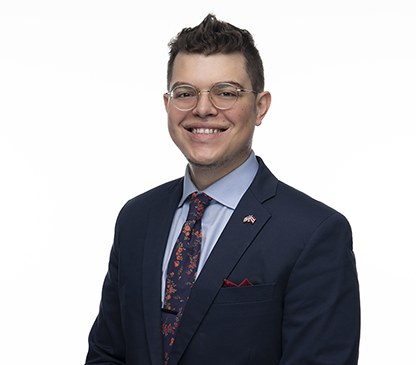
Staff Spotlight
David Díaz Márquez
Air and Missile Defense Sector

In 2023, APL’s Hispanic & Latinx Culture Club, known as ¡HOLA!, celebrated its 20th anniversary. Originally founded to create cultural and social connections among Hispanic and Latin American staff members through events and programs, the club now has much broader goals. While still a connective hub, ¡HOLA! also fosters career growth and offers mentoring and professional development opportunities.
The club’s renewed efforts on career development have largely been organized by a wave of new leadership. David Díaz Márquez, an early-career staff member and flight test strategy and design engineer in the Laboratory’s Air and Missile Defense Sector (AMDS), became involved with the club shortly after he was hired in 2022. In 2023, he was elected club co-leader, along with his sister Tania Díaz Márquez, a radar testing and evaluation analyst in AMDS.
As co-lead, he was part of the team that developed the Latinos in the Workforce panel — a collaboration between APL and Johns Hopkins Medicine — as part of the organizations’ Hispanic Heritage Month celebrations. The event featured four speakers, two from science, technology, engineering and math (STEM) tracks and two from non-STEM tracks, as well as representatives from each organization’s Hispanic and Latino affinity groups.
“We want our staff to learn from individuals who have successfully overcome the challenges that they’re currently facing,” David Díaz Márquez explained. “By sharing insights from their journey to management roles, including both successes and setbacks, we aim to equip the next generation with the knowledge to overcome similar obstacles.”
Understanding cultural nuances can help anyone, including non-Hispanic people, be better co-workers, better allies, better supervisors.
As to the challenges he sees being addressed in events like this, Díaz Márquez says ¡HOLA! events aim to make people comfortable asking for help with seemingly small tasks, like knowing when to ask for help, and with bigger things such as career development plans.
“Most of the phrases that I know, I know in Spanish, and part of getting used to living in the United States is learning local colloquialisms in English,” he said. “I remember hearing people say, ‘the squeaky wheel gets the grease,’ but on the other hand, I’ve also heard, ‘El árbol que más frutos da es al que más le tiran piedras,’ which translates to, ‘The tree that bears the most fruit is the one that gets the most stones thrown at it.’
“So you have two very similar phrases that mean very different things, and it can be hard to decipher which one of these cultural norms someone grew up with, and how they might affect how people perceive themselves at work.”
Events like the Latinos in the Workforce panel allow Hispanic and Latin American staff members to freely discuss their goals and obstacles, and they also serve as an educational opportunity for people across the Lab to appreciate the importance of trying to better understand each other. "Understanding cultural nuances can help anyone, including non-Hispanic people, be better co-workers, better allies, better supervisors," said Díaz Márquez.
He's also looking at the Laboratory's strategy and beyond events, exploring how groups like ¡HOLA! can continue to have broad impact across APL. "When I see 'be a model organization for DEI,' as one of APL’s strategic goals, I think about giving a voice to each of us in the APL community and ensuring that APL's evolution is deeply intertwined with our shared values," he said. "Feedback from APL affinity groups has led to new facilities, new policies and new systems across the Lab. I believe this sets APL apart from the competition, and I am truly interested to see how this key strength is developed over the next 20 years."